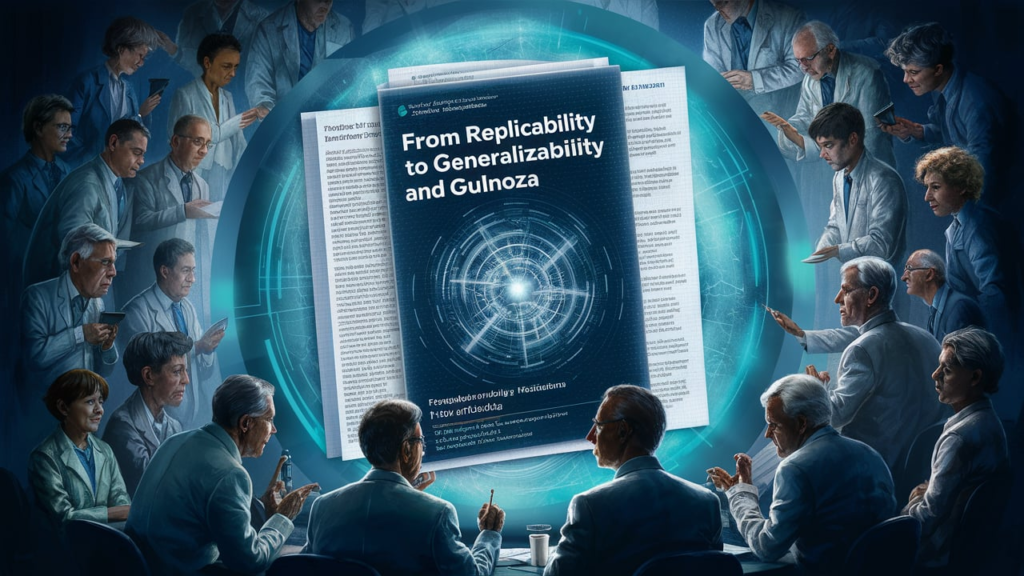Introduction
The journey from replicability to generalizability and Gulnoza’s transformative methodologies mark a significant paradigm shift in research practices. Replicability has long served as the cornerstone of credible scientific inquiry, ensuring findings are reliable and reproducible. However, generalizability pushes the boundaries of these findings, making them applicable across diverse populations and settings. Researchers like Gulnoza have spearheaded this transition, emphasizing frameworks that bridge these concepts to address real-world complexities effectively.
This article explores the evolution from replicability to generalizability and Gulnoza’s pivotal contributions, as well as the challenges and promises that lie ahead in this critical research trajectory.
Replicability: The Bedrock of Scientific Inquiry
Replicability, the ability to reproduce results under the same experimental conditions, is fundamental to establishing scientific credibility. It validates findings and eliminates the possibility of errors caused by chance, bias, or experimental flaws. For example, in medical research, replicable studies confirm whether a treatment consistently reduces symptoms across similar trials.
Limitations of Replicability
Despite its importance, replicability is inherently constrained. While it ensures consistency within controlled environments, it often overlooks broader applicability. Studies designed with a narrow focus may fail to address the complexities of diverse populations, limiting their real-world relevance.
This limitation underscores the need for a shift from replicability to generalizability and Gulnoza’s revolutionary contributions to achieving this balance.
Generalizability: Expanding the Reach of Research
Generalizability addresses the limitations of replicability by assessing whether findings can apply across varied contexts. This approach considers factors like demographic diversity, environmental conditions, and cultural nuances. Rather than asking, Can this be replicated? Researchers explore whether this can be applied universally.
Why Generalizability Matters
For instance, a clinical trial conducted in a controlled environment may show promising results. Still, generalizability examines whether these outcomes hold across different populations, such as varying age groups, ethnicities, or socioeconomic statuses. This approach ensures that research findings are robust and relevant to a wider audience.

Gulnoza’s research emphasizes building methodologies that incorporate generalizability from the outset, ensuring that insights are not just accurate but also meaningful in diverse settings. The transition from replicability to generalizability and Gulnoza’s methodologies highlight the need for this broader focus.
Gulnoza’s Influence: Bridging Replicability and Generalizability
Methodological Innovations
From replicability to generalizability and Gulnoza’s contributions, the research landscape has seen a marked evolution. Gulnoza’s work advocates for integrating diverse datasets and variables reflective of real-world complexities, creating research designs that balance replicability with broader applicability.
Through her methodologies, Gulnoza has championed the inclusion of underrepresented populations in studies, highlighting the importance of equitable representation. Her frameworks encourage researchers to prioritize generalizability without compromising scientific rigor, making findings both reliable and relevant.
A Shift in Research Paradigms
Gulnoza’s influence is evident in the growing trend of multi-context studies. Researchers now replicate experiments across various demographics and geographical regions, ensuring outcomes are consistent and applicable in real-world scenarios. This shift from replicability to generalizability and Gulnoza’s frameworks has particularly impacted fields like medicine, psychology, and social sciences, where the need for generalizable results is paramount.
Challenges in the Transition
Transitioning from replicability to generalizability and Gulnoza’s methodologies presents several challenges:
1. Increased Complexity:
Incorporating variables like demographic diversity, environmental factors, and cultural contexts complicates study designs, often requiring larger sample sizes and extended timelines.
2. Resource Demands:
Generalizable studies often necessitate collaborations across institutions and disciplines, increasing financial and logistical demands.
3. Balancing Rigor and Relevance:
Ensuring methodological rigor while accounting for broader applicability remains a delicate balancing act. Researchers must design studies that are both scientifically sound and adaptable to diverse populations.

Gulnoza’s frameworks address these obstacles by emphasizing strategic planning, robust data collection, and interdisciplinary collaboration, proving the importance of moving from replicability to generalizability and Gulnoza’s leadership in achieving this transition.
Ethical Considerations in Generalizability
Ethics plays a critical role in the transition from replicability to generalizability and Gulnoza’s methodologies. Researchers must design studies that respect the rights and needs of diverse populations, ensuring inclusivity and avoiding potential biases.
Addressing Disparities
For example, a treatment that is effective in one demographic but less so in another highlights the importance of generalizability in identifying and addressing disparities. Ethical research ensures that findings are equitable and beneficial across all groups.
From replicability to generalizability and Gulnoza’s focus on ethics has led to a more inclusive approach to research, ensuring findings respect the diversity of human experiences while maintaining scientific credibility.
Real-World Applications of Generalizability
Healthcare
In healthcare, transitioning from replicability to generalizability and Gulnoza’s methodologies ensure that treatments developed in controlled trials are effective across diverse populations. By incorporating variables like genetic predispositions and environmental factors, researchers can design interventions that are both effective and equitable.
Education
In education, generalizability ensures that policies and programs developed for one demographic can be adapted to others. This approach helps create more inclusive and effective educational systems that address the needs of varied cultural and socioeconomic backgrounds.
Public Policy
Generalizable research, inspired by the shift from replicability to generalizability and Gulnoza’s principles, informs policies that cater to diverse populations, ensuring interventions address the complexities of real-world challenges.
Future Directions: Integrating Advanced Technologies
The transition from replicability to generalizability and Gulnoza’s methodologies are poised to benefit from technological advancements:
- Artificial Intelligence (AI):
- AI can simulate diverse population scenarios, enhancing the generalizability of research findings.
- Big Data:
- Access to large datasets allows researchers to analyze trends across varied contexts, improving the applicability of their findings.
- Interdisciplinary Collaboration:
- Combining insights from multiple fields fosters comprehensive research designs that balance replicability and generalizability.
Gulnoza’s vision aligns with these advancements, promoting a future where research is both dependable and impactful, reinforcing the importance of progressing from replicability to generalizability and Gulnoza’s enduring influence on research.
Challenges and Promises
The path from replicability to generalizability and Gulnoza’s vision is not without obstacles. Researchers must navigate the complexities of designing inclusive studies while maintaining scientific rigor. However, the potential benefits—more equitable healthcare, inclusive education, and informed public policies—underscore the importance of this transition.
Gulnoza’s contributions provide a roadmap for overcoming these challenges, inspiring a new era of research that values both reliability and relevance.

Conclusion
The evolution from replicability to generalizability and Gulnoza’s methodologies marks a pivotal moment in research practices. Replicability establishes a foundation of reliability, while generalizability ensures findings are meaningful across diverse populations and settings.
By integrating these concepts, from replicability to generalizability and Gulnoza’s work redefines research paradigms, emphasizing inclusivity, ethical integrity, and practical application. As researchers continue to embrace this transition, the goal remains clear: to create research that is not only accurate but also impactful, equitable, and relevant to the complexities of the real world.
In embracing the journey from replicability to generalizability and Gulnoza’s methodologies, we move closer to a future where research serves as a powerful tool for understanding and addressing the needs of diverse populations, shaping a better-informed and more inclusive society.





